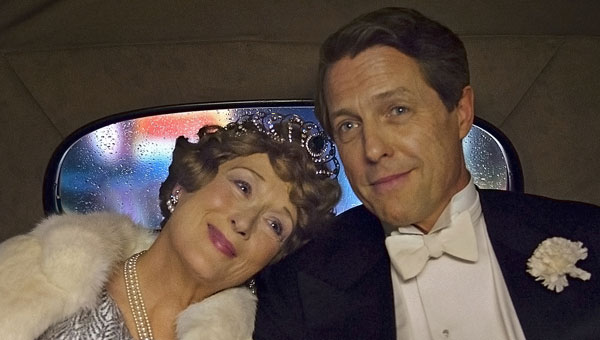Florence Foster Jenkins Review

Show business is all about extremes.
Just look at X-Factor and other such shows: the spotlight is cast as firmly on those with absolutely no natural talent and an obliviousness to same, as it is on the truly gifted.
It’s the mediocre who tend to be forgotten.
Stephen Frear’s new feature Florence Foster Jenkins focuses on a budding songstress from the 1940’s who is neither talented nor mediocre. But she is clearly remembered.
The story is based on true events surrounding the singing career of the titular heroine, played by Meryl Streep.
Florence is someone who embraces life, despite the long-term impact on her health from the syphilis she contracted through her first husband.
She is cared for, both literally and figuratively, by her current husband, St Clair Bayfield (Hugh Grant).
St Clair fancies himself as a bit of a thespian and is not overly ignorant to Florence’s personal financial resources. He also enjoys the frequent company of his mistress Kathleen (Rebecca Ferguson), with whom he shares a separate apartment.
Grant has clearly maintained his position as Hollywood’s go-to guy when it comes to posh cads.
Florence’s lifelong love of music prompts her to recommence singing lessons. For this she needs a pianist for accompaniment, who arrives in the form of Cosmé McMoon (Simon Helberg). It is through Cosmé that we witness Florence’s singing for the first time and realise that no amount of lessons can help her.
A few lessons in, and encouraged by the fawning feedback of everyone around her, Florence decides to throw a small concert. Her doting husband manages to bribe any journalists who show up and carefully screens the other attendees, so to weed out the ‘mockers and the scoffers’.
Unsurprisingly, the rigged audience reacts with passionate acclaim. The problem arises when Florence, emboldened by this success, then sets her sights on Carnegie Hall.
Frears, we all know, is a steady hand, but a large portion of the film’s success is underpinned by a nuanced screenplay from Nicholas Martin, making his feature-length debut.
The script tonally shifts between tragic and comic throughout and allows us to be amused by Florence’s singing, whilst managing to avoid making her the butt of the joke.
Grant and Streep are dependably solid in the central roles and give depth to two otherwise dubious characters.
Helberg, better known as Howard from The Big Bang Theory, is great as the painfully nervy McMoon. Nina Arianda also catches the eye in a supporting role.
Sure, the ambiguity in the main characters’ motivations remains and can be jarring in such a generally breezy film. Is St Clair simply a callous swindler? Is Florence aware of the sycophantic behaviour driven by her wealth? Is McMoon driven by ambition or loyalty?
But such questions simply serve to lend emotional weight to the film’s closing scenes. You might just find yourself walking out of the cinema with a smile on your face and a tear in your eye.
Conor Brennan